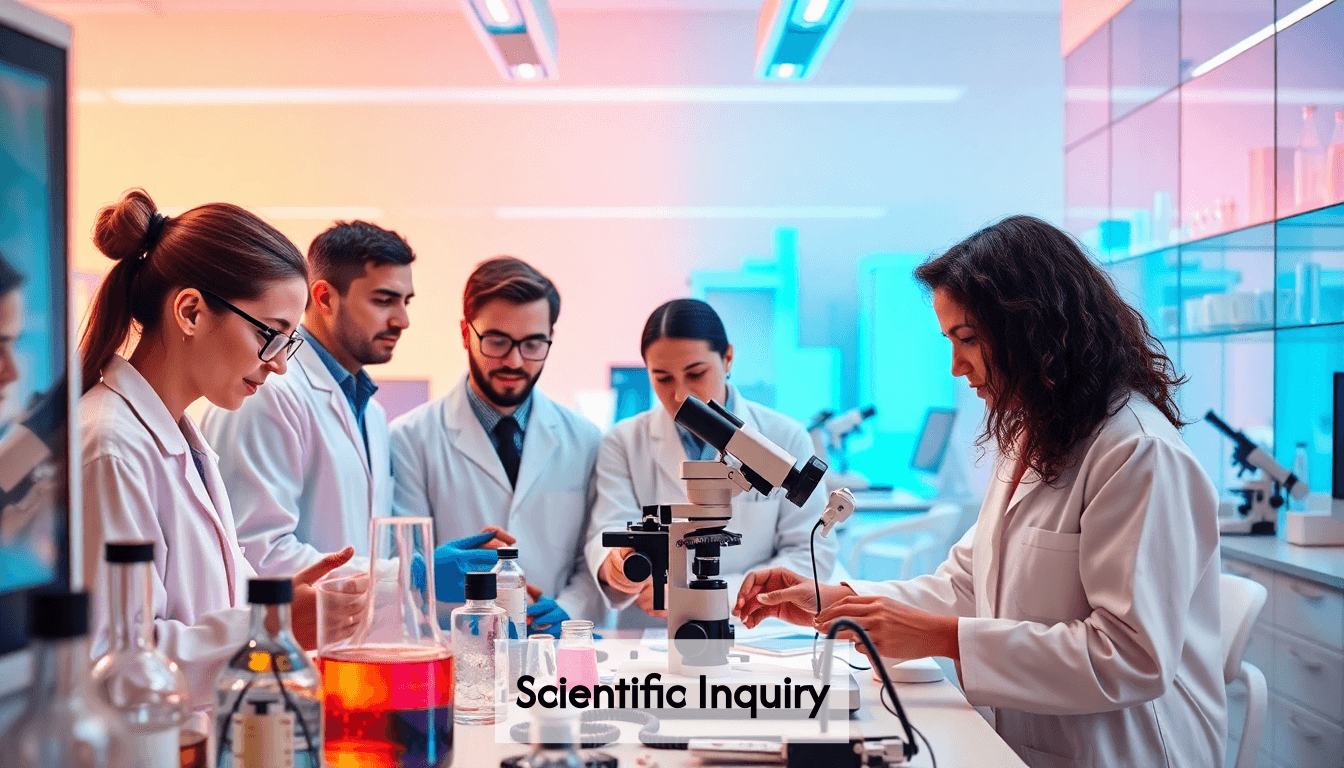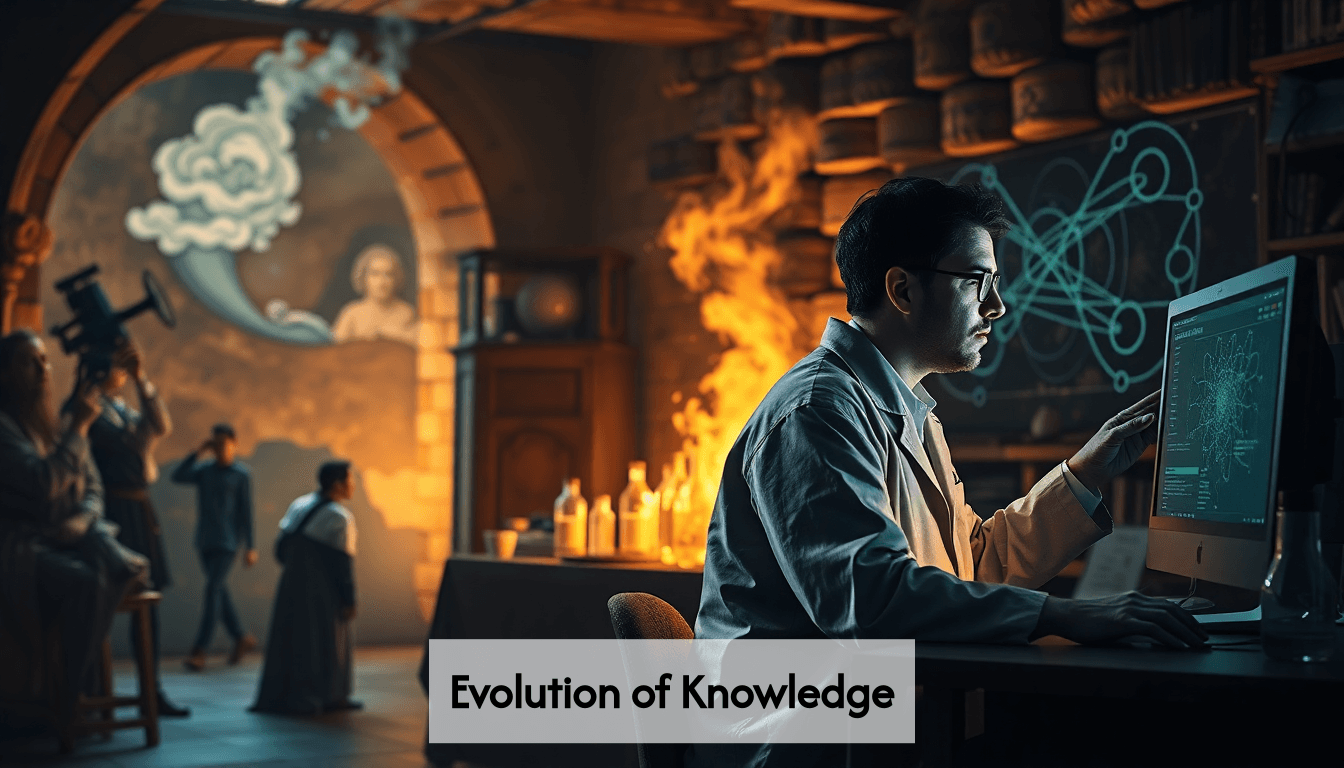Loading...


Science is revolutionizing the way we understand and interact with our world—over 60% of all innovations come from scientific research. But here’s the kicker: many people think science is just a collection of facts and theories. The real magic lies in the scientific method itself. It’s the driving force that transforms curiosity into groundbreaking discoveries and practical solutions that enhance our lives. Curious to see how this age-old process shapes everything from our healthcare to the technology we use daily?
Science, at its core, represents humanity's systematic quest to understand the world through observation, evidence, and logical reasoning. An essay on what is science must begin by examining its fundamental definition and purpose.

Science exists as both a body of knowledge and a process. The word itself derives from the Latin "scientia," meaning knowledge. However, science transcends mere information collection. It embodies a methodical approach to discovering how and why things work as they do.
According to the Science Council, science can be defined as "the pursuit and application of knowledge and understanding of the natural and social world following a systematic methodology based on evidence." This formal definition emerged in the UK following the 2006 Charities Act, highlighting science's evidence-based nature.
At the heart of any science essay or paragraph about science lies discussion of the scientific method. This systematic approach typically involves:
This process distinguishes science from other knowledge systems by its commitment to empirical evidence and willingness to revise conclusions when new evidence emerges.
Unlike dogmatic belief systems, science functions as a self-correcting enterprise. What sets science apart in essays about science is this fundamental characteristic - its conclusions remain tentative and open to revision. Scientific knowledge evolves as researchers build upon, refine, and sometimes completely overturn previous understanding.
Scientific progress thrives on skepticism. Scientists actively seek to challenge existing theories, not out of contrarianism, but because rigorous testing strengthens reliable knowledge while discarding flawed ideas.
The purpose of science extends beyond satisfying human curiosity, though that remains a powerful motivator. Science serves multiple essential functions in society:
Science systematically expands human understanding of natural phenomena, from subatomic particles to cosmic structures and everything between. This knowledge forms the foundation for technological advancement and improved decision-making.
Scientific approaches provide frameworks for addressing complex challenges facing humanity. From disease prevention to environmental protection, science essays often highlight how scientific inquiry offers evidence-based solutions to pressing problems.
The scientific process fosters critical thinking skills applicable far beyond laboratory settings. By emphasizing evidence evaluation, logical reasoning, and systematic analysis, science education cultivates intellectual tools valuable in all aspects of life.
Science represents humanity's most successful method for determining what is reliably true about our world. Its combination of empirical evidence, logical analysis, and openness to revision has propelled extraordinary advances in knowledge and technology. When writing a science essay or paragraph on science, understanding this foundation helps contextualize specific scientific disciplines and discoveries within the broader enterprise of human knowledge-seeking.
| Takeaway | Explanation |
|---|---|
| Science is a systematic quest for knowledge | Science is defined as the pursuit and application of knowledge about the natural and social world through evidence-based methodologies, enabling better understanding and decision-making. |
| The scientific method encourages continual revision | The scientific method is characterized by observation, hypothesis formation, experimentation, and analysis, promoting a self-correcting nature where conclusions are open to revision as new evidence emerges. |
| Science underpins technological and medical advancements | Scientific inquiry leads to breakthroughs in technology and healthcare, from smartphones to personalized medicine, significantly enhancing everyday life and solving complex issues. |
| Collaboration drives modern scientific progress | Contemporary science increasingly relies on interdisciplinary teamwork, reflecting a shift from individual contributions to collective efforts in addressing complex research challenges. |
| Ethics are integral to scientific practice | Ethical considerations are now central to scientific methodology, ensuring that research is conducted responsibly and in the context of its broader societal implications. |

The journey of science through human civilization reveals a fascinating progression from primal curiosity to sophisticated methodologies. An essay on science must acknowledge this rich historical tapestry that has shaped our modern understanding.
Scientific thinking did not emerge suddenly but evolved gradually from humanity's earliest attempts to make sense of natural phenomena. Ancient civilizations in Mesopotamia, Egypt, India, and China developed practical knowledge of astronomy, mathematics, and medicine that laid crucial foundations for scientific thought.
The ancient Greeks made particularly significant contributions to early science. Thinkers like Aristotle, Archimedes, and Hippocrates established systematic approaches to studying the natural world. Their emphasis on observation and logical reasoning represented pivotal steps toward what we now recognize as scientific methodology in any essay about science.
When European intellectual progress slowed during the Middle Ages, scholars in the Islamic world preserved and expanded scientific knowledge. Between the 8th and 14th centuries, Muslim scientists made remarkable advances in mathematics, astronomy, optics, medicine, and chemistry.
Figures like Ibn al-Haytham revolutionized optics and pioneered the experimental method, while scholars such as Al-Khwarizmi developed algebra and algorithms—concepts fundamental to modern computation. Their contributions feature prominently in any comprehensive science essay or paragraph on science.
The 16th and 17th centuries witnessed a profound transformation in how humans approached natural knowledge. This Scientific Revolution challenged ancient authorities and established the experimental method as the cornerstone of scientific inquiry.
Copernicus's heliocentric model upended traditional cosmology. Galileo's telescopic observations provided empirical evidence supporting this revolutionary view. Meanwhile, Newton synthesized terrestrial and celestial physics under unified mathematical laws—achievements that any essay in science would recognize as pivotal.
Francis Bacon and René Descartes articulated philosophical frameworks that emphasized empirical evidence and mathematical reasoning, respectively. These complementary approaches solidified the methodological foundations of modern science.
The 19th and 20th centuries witnessed an acceleration of scientific progress that transformed human understanding across all disciplines. Darwin's theory of evolution revolutionized biology. Einstein's relativity theories fundamentally changed physics. The discovery of DNA's structure by Watson and Crick opened new frontiers in genetics.
Modern science has become increasingly specialized, with researchers focusing on ever-narrower fields of inquiry. Yet interconnections between disciplines have also grown more important, leading to fertile cross-disciplinary work. A paragraph about science today would highlight this balance between specialization and integration.
The history of science demonstrates that scientific understanding evolves continuously. Consider astronomy: from ancient star-gazers to modern astrophysicists, our understanding of celestial bodies has undergone multiple revolutions. Even established ideas face revision when new evidence emerges—as when Pluto, once classified as the ninth planet, was reclassified as a dwarf planet in 2006 following new discoveries about trans-Neptunian objects.
Historically, science essays often portrayed scientific progress as driven by isolated geniuses making breakthrough discoveries. While individual brilliance remains important, modern science functions predominantly as a collaborative enterprise. Today's complex research questions typically require interdisciplinary teams, sophisticated equipment, and international cooperation.
This evolution from individual to collective effort reflects broader changes in how science operates. Contemporary scientific advancement depends on peer review, replication studies, and transparent methodologies—institutional practices that help maintain scientific integrity.
The history of science reveals not merely an accumulation of facts but an evolving approach to knowledge itself. From mystical explanations to evidence-based understanding, from isolated thinkers to global research networks, science has continuously refined its methods while expanding human knowledge. Essays on science frequently highlight this developmental journey as central to understanding science's current form and future potential.
Science permeates virtually every aspect of modern existence, often in ways so fundamental we barely notice its presence. From the moment we wake up until we fall asleep, scientific principles and discoveries shape our experiences and enhance our quality of life. This omnipresence of science in everyday activities makes it an essential topic for any essay what is science.
Much like gravity, science exerts a constant influence on daily life whether we acknowledge it or not. The homes we live in stand as monuments to scientific understanding of materials, engineering, and thermodynamics. The clean water flowing from our taps represents triumphs in chemistry, microbiology, and public health science. Even seemingly simple morning routines involve dozens of scientific applications.
Science is "omnipresent and omnipotent in all aspects of life", influencing everything from how we brush our teeth to how we communicate with others across the globe. What makes science particularly remarkable is how seamlessly it integrates into our routines—so thoroughly that we often take its contributions for granted.
Perhaps the most obvious manifestation of science in daily life comes through technology. Every smartphone represents the culmination of scientific breakthroughs in multiple fields:
Beyond personal devices, technology transformed by scientific advancement surrounds us in transportation systems, entertainment platforms, and workplace tools. A paragraph about science in modern life would be incomplete without acknowledging how scientific principles have revolutionized communication, commerce, and creativity through technological innovation.
Few areas demonstrate science's profound influence more clearly than healthcare. From antibiotics to advanced imaging technologies, scientific discoveries have dramatically extended human lifespans and improved quality of life. Consider how science shapes our medical experiences:
Vaccines, nutritional guidelines, and public health measures—all products of scientific research—prevent countless illnesses before they occur. Understanding germ theory alone has saved millions of lives through improved sanitation and hygiene practices.
Modern diagnostic tools like MRIs, genetic tests, and laboratory analyses enable healthcare providers to identify conditions with unprecedented precision. These technologies emerge directly from scientific research in physics, biology, and chemistry.
Personalized medicine represents one of the most exciting frontiers in healthcare, using genetic information to tailor treatments to individual patients. From targeted cancer therapies to customized drug dosages, science continues transforming medical practice in increasingly sophisticated ways.
Science essays often overlook one of humanity's most fundamental concerns: food. Scientific advances have revolutionized agriculture, enabling farmers to feed billions more people than previously possible. Agricultural science has developed crop varieties resistant to disease and drought, while food science ensures safety and extends shelf life.
Biotechnology, including genetic modification techniques like CRISPR, offers tools to address challenges in food security and nutrition. Meanwhile, environmental science helps develop sustainable farming practices that can feed growing populations while protecting ecosystems.
As humanity confronts environmental challenges, science provides both understanding and solutions. Environmental monitoring technologies detect pollution levels and climate changes. Materials science develops biodegradable alternatives to conventional plastics. Renewable energy technologies emerged directly from scientific research in physics, chemistry, and engineering.
In an essay on what is science, these environmental applications highlight science's role not just in creating new technologies but also in addressing their unintended consequences—demonstrating the self-correcting nature of scientific inquiry.
Beyond these concrete applications, science influences daily life by promoting evidence-based thinking. The scientific approach to knowledge—forming hypotheses, gathering evidence, and adjusting conclusions accordingly—offers a powerful model for decision-making in personal and professional contexts.
When we check weather forecasts before planning outdoor activities, compare product reviews before making purchases, or research health information before medical decisions, we apply scientific principles to everyday choices. This methodical approach to gathering and evaluating information represents one of science's most valuable contributions to daily life.
Science's integration into daily life illustrates its remarkable versatility and relevance. From technological marvels to medical breakthroughs, from food production to environmental protection, scientific approaches continually enhance human existence. Any paragraph on science must acknowledge this profound interconnection between scientific advancement and everyday experience—the ways in which abstract principles manifest in concrete improvements to how we live, work, and understand our world.
The scientific method—that systematic approach to inquiry involving observation, hypothesis formation, experimentation, and analysis—continues to transform our world in increasingly profound ways. Any comprehensive essay what is science must examine how contemporary applications of scientific methodology drive innovation and shape society.
While traditionally presented as a linear sequence of steps, modern scientific practice has evolved into something far more dynamic and iterative. Today's scientists rarely follow a rigid formula, instead moving fluidly between observation, hypothesis refinement, and experimentation. This evolution reflects a more sophisticated understanding of how effective discovery actually works.
Rather than viewing the scientific method as a fixed procedure, contemporary science treats it as a flexible framework that adapts to the unique challenges of different research questions. This nuanced approach has proven particularly valuable as scientists tackle increasingly complex problems that cross traditional disciplinary boundaries.
Modern technology has dramatically expanded scientists' capabilities at every stage of the scientific process. Advanced instruments detect phenomena previously invisible to human senses. Powerful computing resources analyze vast datasets that would overwhelm manual methods. These technological enhancements accelerate the pace of discovery while enabling investigations into previously inaccessible realms.
Artificial intelligence has emerged as a particularly transformative force in scientific methodology. AI systems can now analyze enormous datasets to identify patterns and suggest hypotheses that human researchers might overlook. This capability is revolutionizing fields from genetics to climate science, where AI tools identify gene behaviors linked to diseases or predict future climate patterns with unprecedented accuracy.
Modern scientific methodology increasingly emphasizes cross-disciplinary collaboration. Complex challenges like climate change, pandemic response, or artificial intelligence development cannot be adequately addressed through isolated disciplinary approaches. Instead, they require integrated perspectives from multiple scientific fields.
A science essay today would note how biologists, chemists, physicists, computer scientists, and mathematicians now routinely collaborate on shared research questions. This cross-pollination of methods and perspectives has proven especially fruitful in emerging fields like:
At the intersection of biology and computer science, bioinformatics applies computational methods to analyze biological data. This approach has accelerated genomic research, drug discovery, and our understanding of evolutionary processes.
Combining quantum physics with computer science, this field develops computing systems that harness quantum mechanical phenomena. Such systems promise to revolutionize domains from cryptography to materials science.
Drawing from chemistry, biology, geology, meteorology, and other fields, environmental science exemplifies how integrated approaches address complex systems. This comprehensive methodology proves essential for understanding and addressing ecological challenges.
The scientific method's impact has expanded through the open science movement, which promotes transparency, accessibility, and collaboration. Digital platforms enable researchers to share data, methodologies, and findings globally, allowing broader participation in the scientific enterprise.
This democratization of science represents a significant evolution in how scientific methods influence society. When communities can access research results and even participate in citizen science projects, the boundary between scientific institutions and the broader public becomes more permeable.
A paragraph about science in the modern era would be incomplete without acknowledging the "replication crisis" that has prompted important methodological reforms. When researchers discovered that many published findings could not be reliably reproduced, the scientific community responded with initiatives to strengthen methodological rigor:
These reforms demonstrate science's self-correcting nature—its ability to identify weaknesses in its own processes and implement improvements.
As scientific capabilities advance, questions of ethics and responsible innovation have become increasingly central to scientific methodology. Modern science essays often highlight how contemporary scientific practice incorporates ethical considerations throughout the research process rather than treating them as separate concerns.
From obtaining informed consent in medical studies to assessing environmental impacts of new technologies, ethical frameworks have become integrated components of rigorous scientific methodology. This integration reflects growing recognition that science cannot be divorced from its societal context and consequences.
The scientific method continues evolving to meet emerging challenges. As research questions grow more complex and data volumes increase exponentially, new methodological approaches emerge. Machine learning algorithms now assist in hypothesis generation. Quantum computing promises to tackle previously intractable problems. Distributed research networks enable global collaboration on unprecedented scales.
These developments suggest that scientific methodology will remain dynamic, adapting to new tools and challenges while maintaining its fundamental commitment to evidence-based understanding. Any science essay topic examining modern impacts must recognize this balance between methodological innovation and core principles.
The modern impact of scientific methods extends far beyond laboratories and academic institutions. By providing reliable frameworks for generating knowledge and solving problems, scientific approaches have become essential tools for addressing humanity's most pressing challenges. From pandemic response to climate action, from technological innovation to sustainable development, scientific methodology offers our most powerful means for navigating an increasingly complex world.
Science is defined as the pursuit and application of knowledge about the natural and social world through systematic methodologies based on empirical evidence.
The scientific method is a systematic approach that includes observation, hypothesis formulation, experimentation, analysis, and drawing conclusions. It allows for the testing and validation of scientific ideas.
Science impacts daily life by influencing technology, healthcare, agriculture, and environmental practices, making significant improvements in our quality of life and addressing complex societal challenges.
Ethics are integral to modern scientific practice, ensuring that research is conducted responsibly and considers the broader societal implications of scientific advancements.
Understanding science is pivotal, as it arms us with the tools to tackle life's complex questions. Just like the scientific method encourages inquiry and revision, your academic journey can also benefit from a systematic approach to writing. Are you struggling with getting started on that overwhelming essay? Or perhaps you want to ensure your research paper stands up to scrutiny?

With Samwell.ai, you can seamlessly navigate the intricate world of academic writing. Our platform harnesses advanced AI technology to provide:
Don’t leave your academic success to chance. Join over 3 million satisfied users and transform your writing experience today! Start your journey now at https://samwell.ai and turn your writing challenges into solutions. Act now to revolutionize your academic journey!



